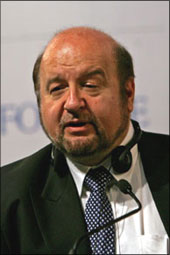 In 1991, the then Indian finance minister Manmohan Singh played a critical role in beginning to liberalise the Indian economy.
In 1991, the then Indian finance minister Manmohan Singh played a critical role in beginning to liberalise the Indian economy.
Nearly two decades later, Dr Singh, now prime minister, appears ready to liberalise the country's notoriously bureaucratic, insular politics.
For starters, Dr Singh has given members of his cabinet two books from Peruvian economist Hernando de Soto Polar, whom the government will turn to for advice on how to handle its massive urban poverty.
Known as the 'poor man's capitalist' for his insistence that market economies must work to include their poorest citizens socially, legally and economically, de Soto is a legend in academia for his work on informal economies and how to bring impoverished populations into the mainstream.
But he's not merely an ivory-tower academic.
He is the president of the Institute for Liberty and Democracy, located in Lima, Peru. In 2004, Time magazine chose him as one of 100 most influential people in the world. And diplomats and policy makers around world seek him out for advice.
De Soto was born in 1941 in Peru, but following a military coup his family soon fled the country for Europe, where he was educated in Switzerland, including at the Graduate Institute of International Studies in Geneva.
Throughout a glittering career, de Soto has gradually shifted away from corporate work and towards his passion: Designing and implementing capital formation programmes and focussing on building transparent business and property laws in underdeveloped parts of the world.
In his capacity as head of the ILD, over two dozen heads of state have invited him to carry out capital formation programmes in their countries.
Describing his methods in a recent ILD brochure, de Soto says, "What we do is help governments build a system of public memory that legally identifies all their people, their assets, their business records and their transactions in such a way that they can unleash their economic potential. No economy can develop and prosper without the benefits that clearly registered public documents bestow."
Much of de Soto's theory is built on the idea that 'assets outside the law', what he calls dead capital, could be used to fuel growth if only they were brought into the legal mainstream.
In client countries like Egypt and Honduras, what he calls dead capital, huge chunks of assets fell under the 'dead capital' grouping, a phenomenon he believes disturbs natural market tendencies toward growth and entrepreneurship.
India could present his greatest challenge yet, for here dead capital is king: In its urban slums (like the bustling economy of Dharavi, almost entirely off the books), and its piles and piles of hoarded, unaccounted for gold and precious stones, the bribes and massive under-the-table payments that are part and parcel of doing business here.
Some estimate that 40 per cent of India's economic activity takes place unofficially without documentation.
For de Soto, it's time to raise this dead capital back to life, to truly unleash the Indian market's promise and potential.
Image: Peruvian economist Hernando de Soto. Photograph: Reuters








 © 2025
© 2025